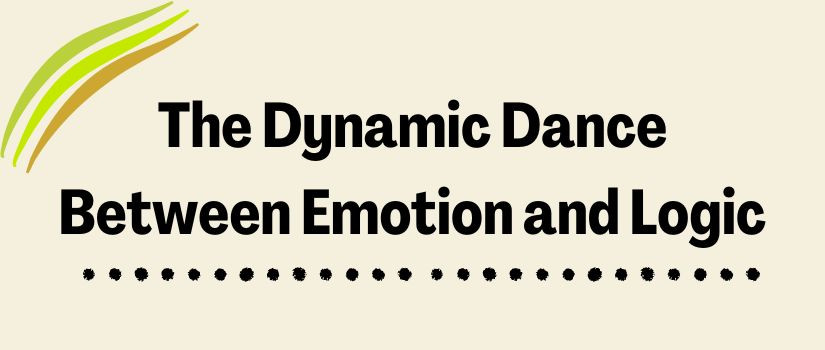
In the realm of decision-making and understanding human behavior, the interplay between emotion and logic is a fascinating and intricate dynamic.
At first glance, emotion and logic might seem like opposing forces, with logic being associated with rationality and reason, while emotion is often seen as impulsive and irrational. However, the reality is far more nuanced.
Emotion and logic are not mutually exclusive; rather, they complement each other in complex ways. Emotions, such as fear, joy, or love, color our perceptions and influence our judgments.
They provide the raw material upon which logic operates, shaping our priorities and values. For example, the fear of failure may drive someone to meticulously plan and strategize, utilizing logic to achieve their goals.
Conversely, logic serves as a guiding framework for navigating the tumultuous waters of emotion. It provides structure and coherence to our thoughts, helping us make sense of our feelings and channel them productively.
When faced with a difficult decision, logical reasoning can help us weigh the pros and cons, considering the long-term consequences beyond the immediate emotional response.
Moreover, emotion can serve as a crucial signal that prompts logical inquiry. For instance, feeling uneasy about a situation may prompt us to gather more information and analyze it critically.
In essence, the relationship between emotion and logic is not one of conflict but of collaboration. They work in tandem, each providing essential elements to the decision-making process. While logic offers structure and analysis, emotion adds depth and context, infusing our choices with meaning and significance.
Recognizing and harnessing this synergy between emotion and logic is key to achieving balance and wisdom in our decision-making.
Embracing the complexity of this relationship allows us to navigate life's challenges with greater insight and clarity, ultimately leading to more informed and fulfilling outcomes.



Ayush Bhargav
Positive Vibes Only
This perspective is crucial, as it shifts the common misunderstanding that logic and emotion are always at odds. Embracing this complexity can lead to more nuanced and effective decision-making.
Building on these ideas, it’s essential to recognize that the balance between emotion and logic varies among individuals and situations. For some people, emotions might play a more dominant role, driving their decisions more frequently than cold, hard logic. For others, the reverse could be true. Understanding one’s natural inclinations can help in fine-tuning this balance, making decision-making more effective.
It’s also worth noting that cultural background significantly influences how we perceive the role of emotions and logic. In some cultures, emotional expression and reliance are valued more highly, while in others, a stoic, logical approach is preferred. This cultural lens shapes how individuals make decisions, from personal choices to professional strategies. Recognizing and respecting these cultural differences is key to effective communication and collaboration in our increasingly globalized world.
Furthermore, the development of emotional intelligence is an invaluable aspect of harnessing the power of emotions in decision-making. Emotional intelligence involves recognizing, understanding, and managing our emotions and the emotions of others. By developing emotional intelligence, we can use emotions to our advantage, applying them to enhance our logical analysis rather than allowing them to undermine it. This skill is particularly valuable in leadership, where understanding and guiding others’ emotions can be just as crucial as applying logical reasoning.
Moreover, integrating technology and artificial intelligence in decision-making processes introduces a new layer to the emotion-logic dynamic. AI and data analytics can provide enhanced logical frameworks that help in processing vast amounts of information and making data-driven decisions. However, these technologies cannot genuinely understand human emotions, which can sometimes lead to decisions that are technically optimal but emotionally or ethically questionable.
Recognizing that emotion and logic are not enemies but partners in the decision-making process provides a more holistic approach to understanding human behaviour. By fostering our emotional intelligence, respecting cultural influences on decision-making, and cautiously integrating technology, we can achieve more balanced and insightful outcomes in both personal and professional arenas.